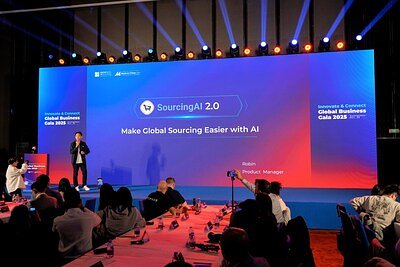
AI-Powered Sourcing Gains Traction: Can China's Platforms Level the Playing Field?
Made-in-China.com's new AI assistant aims to boost global sourcing efficiency. But is the technology truly democratizing trade, or simply refining existing power structures?
AI-Powered Sourcing Gains Traction: Can China's Platforms Level the Playing Field?
NEW YORK, NY – October 29, 2025
The Rise of AI in Global Trade
Made-in-China.com recently launched SourcingAI 2.0 at the 'Innovate & Connect: Global Business Gala 2025,' marking a significant step in the integration of artificial intelligence into the B2B sourcing landscape. The platform claims its new AI assistant can improve buyers’ sourcing efficiency by up to 35%. While independent verification of this specific figure remains elusive, industry experts suggest that AI-driven solutions are indeed poised to revolutionize how businesses find and vet suppliers, particularly from China. This move isn’t isolated; a growing number of platforms are embracing AI to streamline procurement processes, reduce costs, and enhance supply chain transparency.
“The potential for AI to automate routine tasks and provide real-time insights is enormous,” says one supply chain analyst. “It allows companies to focus on strategic sourcing and relationship building, rather than getting bogged down in administrative work.” The launch of SourcingAI 2.0 is part of a broader trend of Chinese B2B platforms investing heavily in AI, potentially reshaping the dynamics of global trade.
Democratizing Access or Consolidating Power?
One of the key questions surrounding the adoption of AI in sourcing is whether it will truly democratize access for small and medium-sized enterprises (SMEs). Traditionally, navigating complex global supply chains has been the domain of large corporations with dedicated resources and expertise. AI-powered platforms like SourcingAI 2.0 promise to lower the barriers to entry, providing SMEs with the tools to identify reliable suppliers, negotiate competitive prices, and manage risk effectively.
“For smaller businesses, the biggest challenge is often simply finding the right suppliers,” explains a business owner who imports goods from China. “AI can help them filter through the noise and focus on the most promising options.” However, some analysts caution that AI could also exacerbate existing power imbalances. If only larger companies can afford to implement and maintain sophisticated AI-powered platforms, it could widen the gap between them and their smaller competitors.
“It’s crucial that these technologies are accessible and affordable for businesses of all sizes,” warns an economist specializing in international trade. “Otherwise, we risk creating a two-tiered system where larger companies reap all the benefits.” Made-in-China.com appears to be addressing this concern by positioning SourcingAI 2.0 as part of a broader ecosystem, integrating it with ‘AI Mic,’ an AI assistant for suppliers launched in 2023. This closed-loop system aims to enhance efficiency for both buyers and sellers, potentially fostering a more equitable trade environment.
Beyond Efficiency: Building Trust in Global Supply Chains
While efficiency is a major driver of AI adoption in sourcing, the technology also offers the potential to address critical challenges related to transparency, risk management, and ethical sourcing. SourcingAI 2.0, for instance, boasts features like supplier background checks and risk assessment tools. These capabilities are particularly important in light of growing concerns about supply chain disruptions, geopolitical instability, and labor practices.
“Trust is paramount in global sourcing,” says a supply chain risk management expert. “AI can help companies verify the legitimacy of suppliers, assess their financial stability, and monitor their compliance with relevant regulations.” By providing greater visibility into the supply chain, AI can also help companies identify and mitigate potential risks, such as counterfeit goods, product defects, and environmental violations.
However, it’s important to note that AI is not a panacea. “AI can provide valuable insights, but it’s still reliant on data,” cautions a technology consultant. “If the data is inaccurate or biased, the AI will produce inaccurate or biased results.” Therefore, it’s crucial to ensure that AI systems are properly trained and monitored, and that human oversight is maintained.
China's Position in the AI-Driven B2B Landscape
Made-in-China.com’s push into AI is emblematic of a broader trend within the Chinese B2B e-commerce market. China is rapidly emerging as a global leader in AI technology, and its B2B platforms are leveraging this expertise to enhance their services and attract international buyers. While Alibaba remains the dominant player in China’s B2B market, platforms like Made-in-China.com are actively investing in innovation to differentiate themselves and gain market share.
“The Chinese government is heavily promoting the development and adoption of AI,” explains a technology analyst. “This is creating a favorable environment for B2B platforms to experiment with new technologies and offer advanced services.” The integration of AI into B2B platforms is not only enhancing efficiency and reducing costs but also improving the overall customer experience and fostering greater trust.
While determining the exact market share of Made-in-China.com within the global B2B landscape is challenging due to a lack of publicly available data, its strategic investments in AI suggest a commitment to long-term growth and a desire to become a leading player in the AI-driven B2B revolution. The company’s closed-loop ecosystem, combining AI Mic for suppliers with SourcingAI 2.0 for buyers, appears to be a unique strategy aimed at creating a comprehensive and efficient trade environment. The impact of this approach remains to be seen, but it signals a significant shift in the dynamics of global sourcing.
